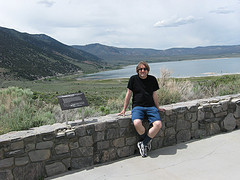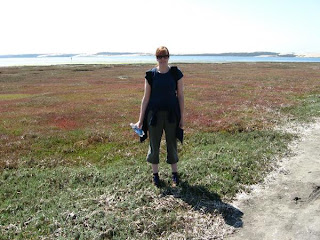Sometimes
we get so busy with our jobs and personal lives, that we don't
realize something we cherish, something we assume will always be
there and that we take for granted, is about to be taken away from us. And
sadly, sometimes when we finally take a moment to pause the rhythm of
our daily lives, to be quiet and listen, it might be too late to do anything
about it.
My
husband Dave and I attended a free screening of the documentary “The
First 70” at the REI store in Santa Monica last Thursday evening.
http://www.thefirst70.com/
The
film focuses on the upcoming closure of 70 California state parks
this July 1; the filmmakers visited each park and interviewed park
employees. Unfortunately, it wasn't the most ideal setting for a
screening – a small movie screen was set up in the middle of the
fluorescent lit store; when the film finally started after several
technical errors (and many apologies from the embarrassed REI
employee), it was often interrupted by loud announcements from the
store's intercom.
But
once the film started, the twenty or so people watching were
transfixed by the images of these parks: cascading waterfalls, lush
green hills, a curious deer staring into the camera, soaring birds, a
historic mansion lovingly maintained by a park employee (who remarked
sadly that she had hoped to work at the park until her retirement).
Park employees, as well as activists fighting to stop the closures,
were interviewed for the film.
The
general concern of the people interviewed seems to be this: the short
term solution of closing these parks in order to make budget cuts
(folks, I'm not even going to pretend to understand how the
California budget works, so I'm not going to go into detail about
that issue) is ultimately a disastrous one. When these parks are
closed, it will be impossible to keep people out of them completely.
As one man in the film remarked, the state is probably not going to build ten foot walls
around these large expanses of land; people will most likely continue
to hike past the “PARK CLOSED” signs, and possibly even camp.
People
hiking into closed, unsupervised parks may not seem like a big deal.
But unfortunately, less conscientious people might leave litter, and
there won't be any park employees to clean up the mess. Without park
supervision, there's also greater danger of fires being started by
careless visitors. And with no park rangers around, if someone is
injured or lost or in danger, who is there to help? Vandalism and
graffiti are also major concerns, as many of these parks are the site
of historic homes and buildings. It was suggested in the film that
closing the parks will ultimately end up costing the state more,
due to the maintenance and repairs that would be required for the
damage done.
Another sort of damage, in a cultural sense, that would be caused by the closures would be the impact upon
school, church and youth groups. Many of these parks have educational
buildings, bookstores, guided tours, etc.; children won't get to benefit from them if these facilities are closed. (One park
employee interviewed bemoaned the fact that children would no longer
be able to look through the telescope in his local park's
observatory.)
To
try to come up with a short term solution and to avoid park closures,
several non-profit groups have become involved (you can find links at
the end of this post). They've raised enough money (as well as their
voices) to prevent several of the parks from closing. One gentleman,
interviewed in the film, is a business owner who took over financial responsibility for one of the
parks and saved it from closure. He owns a brewery and obtains the
water for his brewery from the stream in the park, he wanted to give
something back by saving the park from closure. Fortunately, this man
didn't want the logo for his brewery displayed anywhere in the park;
he simply wanted the park to continue as it had always been.
However,
in the discussion with two non-profit heads after the film, the
question was raised whether or not it was a wise idea to try to raise
money from the private sector. Shouldn't it be the state's
responsibility? One of the non-profit leaders, Alden Olmsted (head of
Olmsted Park Fund), replied that he hoped raising from the private
sector was only a short term solution, as the parks are ultimately
the state's responsibility. The concern was raised that if
businesses took over the park, they might want to display their
company's logo throughout the park (not all business owners being as hands-off as the brewery owner). In the meantime,
they're trying to raise enough funds as possible, as well as enough
uproar, to stop the closures of the remaining parks.
With
the deadline of July 1 coming up, hopefully it's not too late. It's
not surprising that more people aren't aware of this issue and the
upcoming deadline, with the constant barrage of celebrity gossip and
partisan bickering that dominates our headlines. (Why isn't this all
over the news?)
Here's
how you can help:
A
personal end note: yesterday was Father's Day. My father passed away
in 2007 after a long battle with emphysema. He could be a difficult,
cranky guy, especially as he grew older and dealt with his
debilitating health, but he had a good heart, loved children, and was
very witty and intelligent.
One
thing he enjoyed doing when we were kids was going on family road
trips. He loved to drive, especially along winding mountain roads, and
liked to view the changing scenery; he'd make sure to announce points
of interest along the way. In the summer of 1970, we took one of
these road trips, trailer in tow, across the United States. One thing
he always made sure to do is go to as many state and national parks
as possible. There are photos of my brother, sister, mother and I,
squinting in the sun (he always had to take photos of us in
the sun! why?), usually standing before a statue of a bear, or a
historic plaque, or noteworthy sign.
I think he felt it was important
to take us to visit these natural treasures, to show us that there
was a rich, fascinating and adventurous world beyond our little
suburb of Cherry Hill. But mostly, especially since he a banker and
worked in an office from 9 to 5, I think he relished getting out and
enjoying nature.
As
I watched “The First 70” film, I thought of my dad and his love
of parks, and started to feel very emotional. I understand that some
sacrifices have to be made in an attempt to balance the California
budget, but . . . this? Really? I think he would have been
disgusted by the whole thing.
I'm grateful and I feel lucky to have
had a father who understood the importance of traveling beyond one's
own backyard, and hiking amongst the pines and streams, in a paradise
not to be taken for granted.






No comments:
Post a Comment